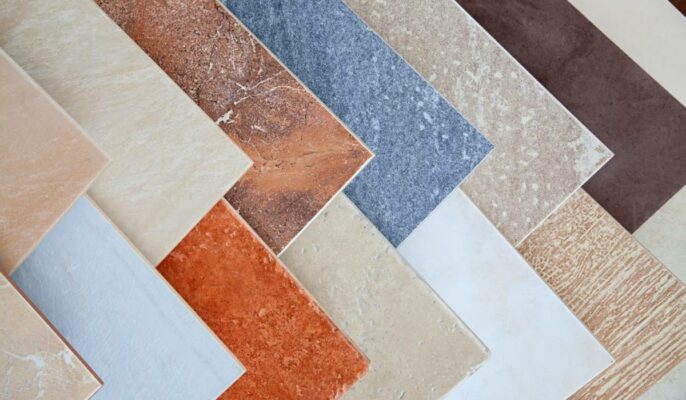
Choosing a new tile might not be at the top of your priority list when thinking about remodeling your home or building a new one. Yet because there are so many different tile types and uses it’s a good idea to start gathering information as soon as possible.
Although tile may occasionally be overshadowed by elements like worktops, cabinets, appliances, and window treatments, it can still make a major impact (in an entryway, kitchen, or bathroom). In light of this, let's look at some interesting trivia as well as some pointers for utilizing these geometrically designed pieces of ceramic or porcelain.
- Tiles have existed for a very long period. In fact, the oldest known tiles date back to roughly 4,700 BC and were discovered in an Egyptian archaeological dig.
- Due to their ease of maintenance, lack of porosity when glazed, and resistance to mold, tiles are the most popular wall covering in bathrooms.
- The most prevalent and diverse kinds of tiles is ceramic ones.
- Ceramic tiles are more expensive than porcelain ones, but porcelain tiles are stronger, better for places with heavy usage, and come in sizes up to two feet square!
- The cost and difficulty of working with real stone and marble tiles are significantly higher. Moreover, they might need to be sealed if they are porous. But there are several cleverly designed and incredibly realistic fake equivalents available.
- The term "bullnose" describes the shape of a tile's edge, which can be either single (rounded on one edge) or double (rounded on both edges) (rounded on both sides).
- As the name implies, subway tiles are typically 3 by 6 inches and were commonly used in subways. They can be placed in many different patterns, including herringbone, and are frequently white.
Bonus factors:
- Mosaic tiles are tiny tiles that have been used for centuries to make ornamental patterns. Mosaics are now frequently provided with a pre-made cloth backing, which makes applying them much simpler than it once was.
- Italians refer to finger tiles as listellos. They are tiny, short, thin tiles that are frequently employed to form borders or ornamental elements in more expensive tile projects.
- Typically, wall tiles are lighter, smaller, and thinner. Moreover, they are typically weaker and not built to handle large temperature swings. Hence, it is better to avoid putting wall tiles on the floor.
- Tile cement is a pre-mixed mortar that, when combined with water, hardens into a thick slurry that adheres tiles to walls and floors.
- Grout is a very fine powdered form of cement that can be any color to fill the spaces between tiles.
- If the tile is not put on a flat surface, it will eventually crack or become loose. Uneven flooring can be corrected with self-leveling cement mixtures, and small holes or flaws in the walls can be filled in or plastered over. For bigger issues, it is best to re-hang new drywall.
Tiles are a far bigger investment than paint, but they may significantly alter the appearance and atmosphere of a space. You should probably invest some time in exploring your alternatives if you're building a new home or remodeling an existing one.
How can we help?
Plaza Middle East General Trading is one of the top ceramic tiles suppliers in Dubai. We have been in the business for many years and can help you with bathroom accessories, kitchen accessories, electrical, plumbing, and other materials you need for home or commercial purposes. We collaborate with various brands and suppliers that help us to provide the best products and services. We are the top RAK tiles suppliers in Dubai who provide you best products to serve your purposes. Our quality is unmatched and our prices are fair and competitive.
Want to know more? Feel free to call us at +971 4 2510881.
Buy Premium Ceramic Tiles in Dubai | Modern & Stylish Designs
Tags: ceramic Tiles Suppliers in Dubai, Rak Tiles Suppliers in Dubai, Best Ceramic Tile Brands in Dubai, Affordable Ceramic Tiles Dubai, Bathroom Ceramic Tiles Suppliers Dubai, Kitchen Ceramic Tiles Dubai, Outdoor Ceramic Tiles Dubai, Top Tile Suppliers in Dubai, Modern Ceramic Tiles Designs Dubai, Luxury Ceramic Tiles Dubai, Ceramic Tile Showroom in Dubai
FAQ
What are the advantages of using ceramic tiles in a home?
Ceramic tiles are long-lasting, easy to maintain, and resist staining and damages, making them a good choice for the home. Many homeowners are particularly fond of ceramic tiles suppliers in Dubai as they have an excellent selection of different styles and options that are both stylish and functional
Can ceramic tiles be used for both floors and walls?
Yes, ceramic tiles can be used for both the floors and walls as well. Many ceramic tiles suppliers in Dubai also have tiles for the wall/floor specially designed to suit each application, allowing for elegant, long-lasting performances.
Are ceramic tiles suitable for outdoor use?
Although ceramic tiles are mostly used indoors, you can find high-quality options specifically designed for outdoors. Calling ahead to ceramic tile suppliers in Dubai will give you insights about their weather-resistant options.
What is the difference between ceramic and porcelain tiles?
Ceramic tiles are created from natural clay and are more porous, while porcelain tiles are denser and more water-resistant. You will find that ceramic tiles suppliers in Dubai offer both options as they both cater toward the needs and preferences of the customer.
Are ceramic tiles water-resistant?
Yes, ceramic tiles are naturally water-resistant, but may need sealing in areas with high-moisture exposure. Ceramic tiles suppliers in Dubai will be able to provide guidance on upkeep to ensure durability.



